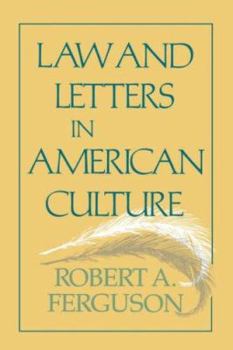Law and Letters in American Culture
Select Format
Select Condition 
Book Overview
The role of religion in early American literature has been endlessly studied; the role of the law has been virtually ignored. Robert A. Ferguson's book seeks to correct this imbalance. With the Revolution, Ferguson demonstrates, the lawyer replaced the clergyman as the dominant intellectual force in the new nation. Lawyers wrote the first important plays, novels, and poems; as gentlemen of letters they controlled many of the journals and literary societies; and their education in the law led to a controlling aesthetic that shaped both the civic and the imaginative literature of the early republic. An awareness of this aesthetic enables us to see works as diverse as Jefferson's Notes on the State of Virginia and Irving's burlesque History of New York as unified texts, products of the legal mind of the time. The Declaration of Independence, the Constitution, and the great political orations were written by lawyers, and so too were the literary works of Trumbull, Tyler, Brackenridge, Charles Brockden Brown, William Cullen Bryant, Richard Henry Dana, Jr., and a dozen other important writers. To recover the original meaning and context of these writings is to gain new understanding of a whole era of American culture. The nexus of law and letters persisted for more than a half-century. Ferguson explores a range of factors that contributed to its gradual dissolution: the yielding of neoclassicism to romanticism; the changing role of the writer; the shift in the lawyer's stance from generalist to specialist and from ideological spokesman to tactician of compromise; the onslaught of Jacksonian democracy and the problems of a country torn by sectional strife. At the same time, he demonstrates continuities with the American Renaissance. And in Abraham Lincoln he sees a memorable late flowering of the earlier tradition.
Format:Paperback
Language:English
ISBN:0674514661
ISBN13:9780674514669
Release Date:January 1987
Publisher:Harvard University Press
Length:432 Pages
Weight:1.35 lbs.
Dimensions:1.0" x 6.2" x 9.3"
Customer Reviews
0 rating





